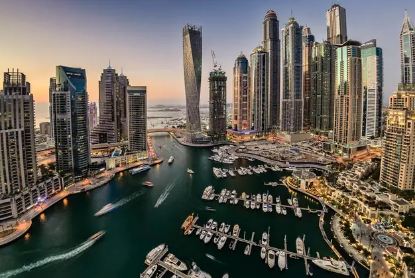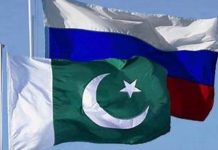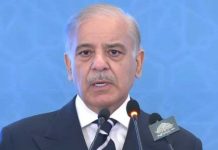Report based on data that provides detailed overview of hundreds of thousands of properties in Dubai
Monitoring Desk
ISLAMABAD: A global collaborative investigative journalism project has revealed the ownership of properties of the global elite in Dubai. The list includes political figures, globally sanctioned individuals, alleged money launderers and criminals. Pakistanis have also been identified on the list and their combined value has been estimated at around $11 billion.
The project — ‘Dubai Unlocked’ — is based on data that provides a detailed overview of hundreds of thousands of properties in Dubai and information about their ownership or usage, largely from 2020 and 2022. Properties purchased in the name of companies and those that are in commercial areas are not part of this analysis.
The data was obtained by the Centre for Advanced Defence Studies (C4ADS), a non-profit organisation based in Washington, DC. It was then shared with Norwegian financial outlet E24 and the Organised Crime and Corruption Reporting Project (OCCRP), which coordinated a six-month investigative project with reporters from 74 media outlets in 58 countries, uncovering scores of convicted criminals, fugitives, and political figures who have recently owned at least one piece of real estate in Dubai. The News and Dawn were partners from Pakistan.
Among the Pakistanis listed in the Property Leaks are President Asif Ali Zardari’s three children, Hussain Nawaz Sharif, Interior Minister Mohsin Naqvi’s wife, Sharjeel Memon and family members, Senator Faisal Vawda, Farah Gogi, Sher Afzal Marwat, four MNAs and half a dozen MPAs from the Sindh and Balochistan assemblies. The Pakistani list also features the late Gen Pervez Musharraf, former prime minister Shaukat Aziz and more than a dozen retired generals as well as a police chief, an ambassador and a scientist – all of whom owned properties either directly or through their spouses and children.
In 2014, President Asif Ali Zardari had received foreign property as a gift. By the time he declared it in 2018, he had gifted it to someone. In 2014, a business tycoon co-accused with Zardari in the fake accounts case, Abdul Ghani Majid, declared in his wealth statement that he had granted a gift of Rs329m but neither mentioned its type nor the recipient. The JIT however recovered a memo about the purchase in March 2014 of a penthouse in Dubai. The Property Leaks data has now unveiled that Ghani had gifted this property to Zardari who gifted it to his daughter.
Chief Financial Officer of Omni Group Aslam Masood along with his wife is also shown as a listed owner of several properties in the data.
Sohrab Dinshaw is also a property owner in Dubai. A villa he purchased in 2015 carried a purchase price of AED 1271888 (Rs 96m).
All of the individuals mentioned were sent questions (except Aslam Masood who is deceased). None responded.
The Altaf Khanani network which was sanctioned by the US for involvement in money laundering has also surfaced on the list. His son, daughter, brother, and nephew are listed owners of several properties in Dubai. Three of them are facing sanctions. Another notable character is Hamid Mukhtar Shah, a Rawalpindi-based physician who was sanctioned by the US for his involvement in the kidnapping, detention of, and removal of kidneys from Pakistani labourers. He is listed as the owner of scores of properties.
The Property Leaks have also revealed that Interior Minister Mohsin Naqvi’s wife owns a property in Dubai which he didn’t declare in the nomination papers he submitted in March this year for the Senate election.
Per the Property Leaks data, Naqvi’s wife owns a five-bedroom villa in the Arabian Ranches. She received a rental income of AED600,000 (Rs45m) from this villa, which was purchased in August 2017 for AED4,347,888 (Rs329m) according to the record. The villa remained in her ownership till April 2023 when it was sold for AED4,550,000 (Rs344m) as per the record.
Since the data available and other organisations was updated till 2022, Naqvi’s wife’s name appeared once in it — related to the above-mentioned information. She however continues to be the owner of a property in Dubai, if Dubai’s land record is taken as a guide.
Responding to questions received from the media partner of this investigative project, she clarified that she had purchased another property in Dubai in January this year when Naqvi was still interim chief minister of Punjab. Two months later, he was a candidate for the Senate seat in March and chose not to declare this property. To a question regarding this, she said: “We will declare it in the current year’s tax declarations and for the ECP”.
According to the data leak assessed by economists and reporters, the number of residential properties owned by foreigners in Dubai put Indians first, at 35,000 properties and 29,700 owners. The total value of these properties is estimated at $17 billion that same year. Owners with Pakistani nationality come second among foreigners at 17, 000 owners of 23,000 residential properties followed by UK citizens and Saudi nationals.
Among the Pakistani owners, the average value per owner is estimated at $0.41 million (Rs11.40m). The combined value of the properties of Pakistanis has been estimated at around $11 billion (Rs30tr) whereas the total value of properties of 204 nationalities is $386 billion (Rs1073.70tr).
The Property Leaks data includes the controlling party of each property, as well as other identifying information such as his or her date of birth, passport number, and nationality. In some cases, the data captured renters instead of owners as mostly it came from official government documents as well as publicly owned utility companies.
The project’s reporters have only revealed the names of owners in cases that serve the public interest. This includes property owners who have been convicted or accused of crimes, are facing sanctions, or are public officials or their associates, including those accused of corruption or who have kept their properties hidden from the public.
Journalists used the data as a starting point to explore the landscape of foreign property ownership in Dubai. They spent months verifying the identities of the people who appeared in the leaked data, as well as confirming their ownership status, using official records, open-source research, and other leaked datasets. Reporters have only included people in the project if their identities could be independently confirmed through other sources.
Dubai’s official land registry was also used to ascertain whether individuals appearing in the data remain property owners. In some cases, reporters could not determine current ownership status, usually because a property had been recently sold. In those cases, extra efforts were made to confirm that the person did own property in Dubai, including combing through real-estate transactions and rental databases.












